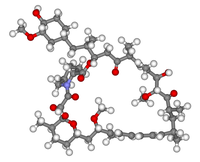
Photo from wikipedia
The phosphoinositide 3-kinases (PI3Ks) are a family of intracellular lipid kinases that phosphorylate the 3'-hydroxyl group of inositol membrane lipids, resulting in the production of phosphatidylinositol 3,4,5-trisphosphate from phosphatidylinositol 4,5-bisphosphate.… Click to show full abstract
The phosphoinositide 3-kinases (PI3Ks) are a family of intracellular lipid kinases that phosphorylate the 3'-hydroxyl group of inositol membrane lipids, resulting in the production of phosphatidylinositol 3,4,5-trisphosphate from phosphatidylinositol 4,5-bisphosphate. This results in downstream effects, including cell growth, proliferation, and migration. The heart expresses three PI3K class I enzyme isoforms (α, β, and γ), and these enzymes play a role in cardiac cellular survival, myocardial hypertrophy, myocardial contractility, excitation, and mechanotransduction. The PI3K pathway is associated with various disease processes but is particularly important to human cancers since many gain-of-function mutations in this pathway occur in various cancers. Despite the development, testing, and regulatory approval of PI3K inhibitors in recent years, there are still significant challenges when creating and utilizing these drugs, including concerns of adverse effects on the heart. There is a growing body of evidence from preclinical studies revealing that PI3Ks play a crucial cardioprotective role, and thus inhibition of this pathway could lead to cardiac dysfunction, electrical remodeling, vascular damage, and ultimately, cardiovascular disease. This review will focus on PI3Kα, including the mechanisms underlying the adverse cardiovascular effects resulting from PI3Kα inhibition and the potential clinical implications of treating patients with these drugs, such as increased arrhythmia burden, biventricular cardiac dysfunction, and impaired recovery from cardiotoxicity. Recommendations for future directions for preclinical and clinical work are made, highlighting the possible role of PI3Kα inhibition in the progression of cancer-related cachexia and female sex and pre-existing comorbidities as independent risk factors for cardiac abnormalities after cancer treatment.
Journal Title: Clinical science
Year Published: 2020
Link to full text (if available)
Share on Social Media: Sign Up to like & get
recommendations!